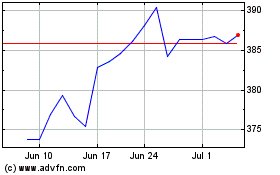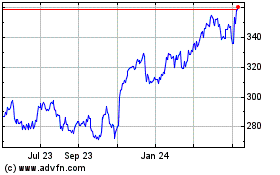UPDATE: Huawei, Motorola Settle Lawsuits Over Intellectual Property
April 13 2011 - 10:54AM
Dow Jones News
Huawei Technologies Ltd. and Motorola Solutions Inc. (MSI) said
Wednesday that they had settled their respective lawsuits against
each other over intellectual property, paving the way for Motorola
to complete the sale of its network-equipment business.
Motorola separately disclosed that it would lower the sale price
of the business to Nokia Siemens Networks to $975 million from $1.2
billion.
The settlement between Motorola and Huawei removes one roadblock
from Motorola's attempt to sell the assets, which has been held up
largely because of Huawei's accusation that Motorola is improperly
selling a business that used its technology. For the Chinese
telecommunications-equipment maker Huawei, the deal is a win as the
company gets paid for technology to be transferred over to Nokia
Siemens, and it gets dropped from a suit alleging that it conspired
with former Motorola employees to steal intellectual property.
The terms of the deal weren't disclosed, but Motorola will pay
Huawei a one-time fee, and Huawei in turn will allow the network
assets to be sold to Nokia Siemens Networks. The two agreements
were negotiated separately, and the fee that Motorola will pay to
Huawei is lower than the $225 million reduction in Nokia Siemen's
purchase price.
The deal is still being held up by Chinese regulators. Motorola
said it expects to close the deal on April 29.
For Huawei, the fee is a demonstration of the strength and
integrity of the company's intellectual property, according to Bill
Plummer, vice president of government affairs for Huawei USA.
"It's a clear vindication of Huawei, our brand, our legal claims
and our business practices," he said.
Huawei continues to fight the perception that it has ties to the
Chinese government and military, something it has denied. Yet its
efforts to enter the U.S. market has met with resistance from
legislators, who have already derailed multiple deals.
Since 2001, Huawei has supplied wireless equipment that used a
technology called GSM, which Motorola resold in areas outside of
the U.S. Under the settlement, the commercial agreements with
Huawei will be transferred to Nokia Siemens.
"With the resolution of these cases, and the misunderstandings
put to rest, Huawei is pleased to move forward with its efforts to
provide innovative solutions to its customers," Guo Ping, vice
chairman of the board and executive vice president of Huawei, said
in a joint statement.
Motorola Chief Executive Greg Brown said, "After reviewing the
facts, we decided to resolve these matters and return to our
traditional relationship of confidence and trust."
Nokia Siemens recently came back to Motorola seeking to
renegotiate the terms of the deal, which was originally announced
in July and was initially expected to close by the end of last
year. Motorola and Nokia Siemens agreed to fewer closing
conditions, further easing the way to completing the transaction.
The deal had been delayed twice due to the Huawei lawsuit and
additional review by the Chinese authorities.
Brown said in an interview last week that he and Nokia Siemens
were committed to the deal, and reiterated his goal of closing the
transaction by the second quarter.
Motorola, which makes public radio systems and enterprise
computing devices, has had to wrestle with this lingering issue
even as it attempts to focus on its core businesses. At the
beginning of the year, it split with Motorola Mobility Holdings
Inc. (MMI), which makes smartphones and cable set-top boxes.
Nokia Siemens is a joint venture between Nokia Corp. (NOK,
NOK1V.HE) and Siemens AG (SI, SIE.XE).
Motorola shares rose 1% to $44.32.
-By Roger Cheng, Dow Jones Newswires; 212-416-2153;
roger.cheng@dowjones.com
Motorola Solutions (NYSE:MSI)
Historical Stock Chart
From May 2024 to Jun 2024

Motorola Solutions (NYSE:MSI)
Historical Stock Chart
From Jun 2023 to Jun 2024
